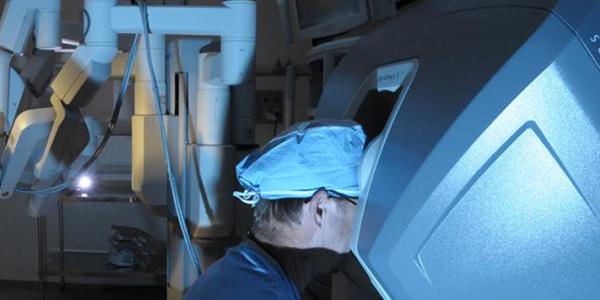
For almost 11 years, El Camino Health has been a leader in the use of robotic-assisted surgery. While it sounds futuristic, robotic-assisted surgery has become a standard of patient care. It is a minimally invasive technique that allows surgeons to perform highly complex procedures through tiny incisions with enhanced precision.
At El Camino Health, surgeons specialize in robotic-assisted procedures for gynecologic, prostate, weight loss and general surgery and use the latest innovation in robotic-assisted surgery: the da Vinci Xi® Surgical System robotic platform.
According to Robotics Program Director Randy Creamier, the benefits to patients of robotic-assisted surgeries can be enormous, “Robotic surgery gives surgeons many advantages compared other minimally invasive surgeries. With the robotic platform, our surgeons can see the surgical field in 3D HD vision, providing enhanced definition of the surgical field. Because the machine has table motion, surgeons can move the operating table instead of shifting a patient mid-surgery.”
“All of these things can add up to safer procedures and efficiencies for our patients,” he continues. “For example, a typical laparoscopic hernia repair surgery can take several hours and require 6 to 15 surgical tacks to attach mesh. However, a robotic-assisted hernia surgery only takes about one hour, requires just a small piece of mesh and two sutures and is an outpatient procedure, depending on the patient.”
As the program director, Randy works with the medical director and the surgeons to block time in the operating room as well as to set up training on the equipment and helps ensure each surgery goes smoothly. Randy has been in a similar role for more than 14 years and he predicts that, by the time he retires, there will be more robotic surgeries performed anywhere than other minimally invasive techniques.
The program at El Camino Health began at the Mountain View hospital in 2006 with just one robotic platform. In its first year, surgeons performed a little more than 100 cases, but since then the program has grown in leaps and bounds. In 2019, the program served more than 1,500 patients. In total, the Mountain View hospital program has served almost 10,000 patients since its inception.
El Camino Health expanded the Robotics Program to the Los Gatos hospital in 2010. With the introduction of the da Vinci Xi Surgical System robotic platform in January 2017, the program has flourished. There have been more than 1,000 cases performed at Los Gatos since June 2017.
More than 50 surgeons are certified to use the robotic platform at El Camino Health. In order to be certified, each surgeon must complete at least eight hours of lab training and perform three proctor surgeries with a physician proctor. A minimum of 10 cases per year need to be performed by the surgeon in order to stay active.
Randy is excited by program’s growth over the years and the support and interest in robotic-assisted surgery. “From day one, we had complete buy in from everyone at El Camino Health. That kind of support, in my opinion, is critical to a program’s success and it has been phenomenal here.”
Learn more about robotic-assisted surgeries at El Camino Health.